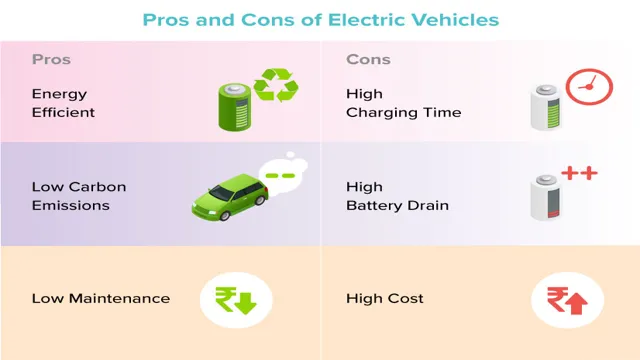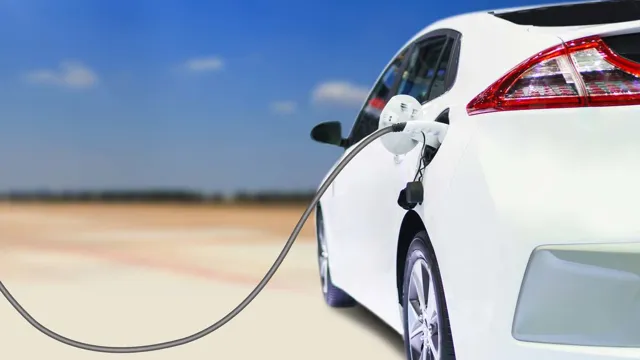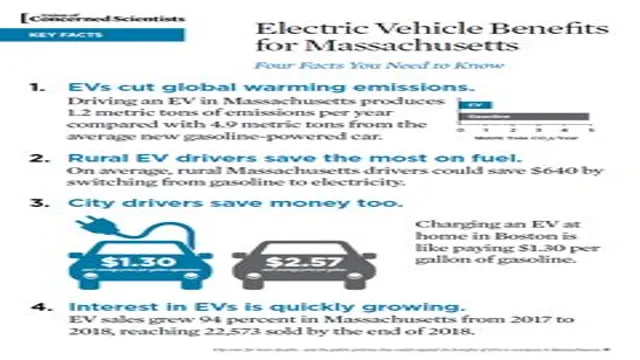The Shocking Truth: How Electric Cars Are Saving Our Planet
Are you aware that the transportation sector is the most significant source of air pollution in the world? The rise of electric cars in recent years has given us a promising solution to reduce this problem and make the world a healthier place to live. The benefits of electric cars for the environment are immeasurable; they ooze power to change the world’s traditional fuel consumption patterns and reduce carbon dioxide emissions. In this blog, we’ll dive into the benefits of electric cars and how they can help preserve our planet.
Are you ready to join the change and adopt an eco-friendly car? Read on to find out why electric cars are a step in the right direction.
Reduced Emissions
One of the significant benefits of electric cars to the environment is their reduced emissions compared to gasoline-powered vehicles. Electric vehicles do not have tailpipes and do not emit pollutants such as nitrogen oxides and particulate matter that harm the environment and contribute to climate change. Moreover, electric cars can be powered with renewable energy sources such as solar and wind power, making them even more environmentally friendly.
By reducing emissions, electric cars also improve air quality, which is critical for human health. With electric cars, we can reduce our carbon footprint and move towards a more sustainable future. It’s exciting to see how technology is changing the automotive industry and positively impacting our planet’s health and well-being.
Zero Tailpipe Emissions
Zero tailpipe emissions have become a hot topic in recent years, as we strive to reduce our impact on the environment. The term refers to the absence of harmful gases coming out of a vehicle’s exhaust system. This is achieved through the use of electric or hydrogen fuel cell technology, which do not produce any emissions during operation.
By switching to these zero-emission vehicles, we can significantly reduce our carbon footprint and improve air quality in our communities. While it may take time for these technologies to become more widespread, they represent a promising solution to one of the biggest challenges facing our planet today. So next time you’re in the market for a new vehicle, consider investing in a zero-emission option to do your part in curbing emissions and preserving our planet.

Lower Carbon Footprint
Reduced Emissions When it comes to lower carbon footprints, reducing emissions is a critical factor. By emitting less pollution and greenhouse gases into the atmosphere, we’re not only helping the planet, but also improving our own health and well-being. There are many ways to reduce emissions, from driving less to switching to renewable energy sources.
But it’s not just about personal actions; companies and governments also have a role to play. By setting emissions reduction targets and implementing policies that encourage sustainability, we can make a significant impact on our carbon footprint. It can be challenging to change our habits, but by taking small steps to reduce emissions every day, we can all make a difference.
So next time you’re thinking about taking a car ride or leaving the lights on, remember the impact it has on our planet and do your part to reduce emissions.
Less Air Pollution
One of the greatest benefits of electric cars to the environment is the reduction of air pollution. Traditional cars emit a variety of harmful pollutants, including carbon monoxide, nitrogen oxides, and particulate matter. These pollutants can have serious health implications for both humans and the environment.
Electric cars, on the other hand, emit no tailpipe pollutants, meaning they don’t contribute to local air pollution. In addition, electric cars also help reduce emissions from the power grid. As more renewable energy sources are incorporated into the grid, the electricity used to power electric cars becomes more and more clean.
So not only are electric cars great for the environment, but they also play a crucial role in helping us get to a more sustainable energy future.
Reduced Health Impacts
Reduced Health Impacts One of the most significant benefits of reducing air pollution is its positive impact on public health. Air pollution is a serious health hazard that can cause a range of health problems, including respiratory diseases, heart disease, and stroke. These illnesses are the result of breathing in harmful pollutants in the air, which are often released by transportation and industry.
By reducing air pollution, we lower the risk of these health problems and improve overall well-being. This can be achieved by shifting to cleaner energy alternatives, improving public transportation, and implementing stricter emission regulations. Imagine taking a hike on a sunny day in a park without worrying about smog slowly poisoning your lungs.
That’s the kind of future we should aim for, where we can breathe cleaner, fresher air, and not fear the consequences. By reducing air pollution, we can make this a reality and improve the quality of life for everyone.
Improved Air Quality
Improved Air Quality With the rise of industrialization, air pollution has become a significant contributor to global warming. However, recent advances in technology and increased awareness of environmental issues have led to improved air quality. Governments and industries worldwide are taking steps to reduce emissions, leading to cleaner air for everyone to breathe.
The introduction of electric vehicles, renewable energy sources, and more stringent pollution regulations have all played a vital role in this progress. Additionally, individuals can help by reducing their carbon footprint through simple changes like using reusable bags and bottles, carpooling, and using public transportation. Improved air quality means fewer cases of respiratory illnesses, healthier communities, and a cleaner environment for all.
Let’s continue to find ways to reduce our impact on the environment and ensure continued progress towards a cleaner and more sustainable world.
Reduced Noise Pollution
Reduced noise pollution is a significant benefit that comes from less air pollution. In urban areas, noise pollution can be a constant source of stress, and in some cases, it can have a significant impact on physical health. Air pollution often adds to the problem of noise pollution, especially in areas with heavy traffic or industrial activity.
When there is less air pollution, it can contribute to a reduction in noise pollution because there are fewer vehicles on the road, and factories may be forced to operate in a cleaner way. This can result in more peaceful and healthier living environments. The reduction of noise pollution can also lead to better sleep, improved cognitive function, and a decrease in the risk of heart disease or other related illnesses.
By addressing air pollution as a whole, we can benefit both the planet’s health and the well-being of individuals living in urban environments.
Less Dependence on Fossil Fuels
One of the biggest benefits of electric cars to the environment is their ability to reduce our dependence on fossil fuels. Fossil fuels, such as oil and gas, are non-renewable resources that take millions of years to form. As a result, they are quickly depleting and becoming increasingly scarce.
Electric cars, on the other hand, can be powered by renewable energy sources, such as solar or wind power. By increasing the use of electric cars, we can significantly decrease our reliance on fossil fuels, which not only reduces carbon emissions but also helps to preserve these precious resources for future generations. Additionally, electric cars are more energy-efficient than traditional gasoline-powered cars, requiring less energy to cover the same distance.
This not only helps to reduce our carbon footprint but also translates into cost savings for the consumer in the long run. Overall, the benefits of electric cars to the environment are clear, and they represent a vital step towards a more sustainable future.
Limited Oil Extraction
Limited oil extraction can be a viable solution to lessen our dependence on fossil fuels. It’s no secret that the world is facing a fossil fuel crisis that’s causing adverse effects to both the environment and the economy. By extracting less oil, we can slow down the depletion of non-renewable resources while simultaneously reducing our carbon footprint.
This means a shift towards a greener and more sustainable energy future. The benefits of tilting towards renewable energy sources are immense. Not only do they lower carbon emissions and reduce environmental damage, but they also create job opportunities and boost local economies.
Adapting to alternative energy sources may present a challenge, but with careful planning, innovation, and investment, it’s an achievable feat. In the long run, we’ll benefit from greater energy security, stability, and less vulnerability to price shocks. By thinking about the planet and future generations, limited oil extraction can help us transition to a sustainable energy future.
Reduced Global Warming
Reduced Global Warming One of the most significant benefits of less dependence on fossil fuels is reduced global warming. Burning fossil fuels releases harmful greenhouse gases like carbon dioxide into the atmosphere, which trap heat and contribute to global warming. By reducing our reliance on these fuels, we can significantly decrease the amount of greenhouse gases released into the atmosphere and curb the effects of climate change.
Fortunately, renewable energy sources like solar and wind power are readily available alternatives to fossil fuels. As we continue to invest in and transition towards these cleaner energy sources, we can help reduce the overall impact of global warming on our planet. So, choosing more sustainable energy options is a simple yet powerful way to do your part in mitigating the effects of climate change.
Renewable Energy Compatible
Electric cars have become increasingly popular due to their numerous benefits, including their compatibility with renewable energy sources. One of the biggest benefits of electric cars is their positive impact on the environment. By switching to electric cars, drivers can significantly reduce their carbon footprint, which is a major contributor to climate change.
This is because electric cars emit far less carbon dioxide compared to traditional gas-powered cars. Additionally, electric cars make use of renewable energy sources, such as solar or wind power, as they can be charged using a self-contained solar-powered charging station. This eliminates the need for fossil fuels and reduces our reliance on non-renewable resources.
The use of renewable energy sources by electric cars is a significant positive step towards sustainable living and a healthier planet. With benefits such as reduced greenhouse gas emissions and the elimination of fossil fuels, electric cars are an excellent choice for environmentally conscious consumers.
Conclusion
In conclusion, electric cars are not just a trend – they are a game changer when it comes to protecting our environment. By eliminating harmful emissions and reducing our reliance on fossil fuels, electric cars offer a cleaner, greener way to get around. By choosing to drive an electric car, we are not only making a smart financial decision, but we are also doing our part to create a healthier planet for ourselves and future generations.
So, let’s leave gasoline in the past and embrace the electric revolution – because after all, driving an electric car is just as fun as driving a gas-guzzler, only with a little extra peace of mind knowing we’re doing our part to save the planet.”
FAQs
How do electric cars benefit the environment?
Electric cars benefit the environment by producing no tailpipe emissions, reducing air pollution and greenhouse gas emissions.
Are electric cars more environmentally friendly than gasoline cars?
Yes, electric cars are more environmentally friendly than gasoline cars as they produce fewer emissions and use less non-renewable resources.
How do electric cars contribute to reducing climate change?
Electric cars contribute to reducing climate change by eliminating tailpipe emissions, which are major contributors to the production of greenhouse gases.
Can electric cars help to reduce the carbon footprint?
Yes, electric cars can help to reduce the carbon footprint by using electricity from renewable sources such as solar and wind power, which do not produce emissions.






